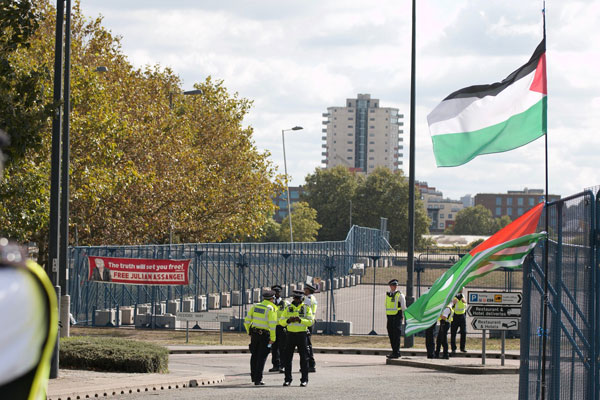Universities in the United States struggle as more arrests are made from pro-Palestinian protests

[Police officers blocking roads, flags of Palestine. Credit to Pixabay]
Recently, universities in the United States have faced pro-Palestinian protests by their own students, with their demands sharing one common theme: divestment from Israel.
Divestment in economics entails reducing the assets of a business and/or firm.
In this case, university students are demanding divestment from Israel and their college’s funding.
These pro-Palestinian protesters believe that funds should be cut off from Israel due to its actions, which many have labeled as genocide.
This includes divestment from weapon manufacturers, businesses profiting from the Gaza Strip war, and other Israeli products.
In an extreme case, a student’s inflammatory remark, “Zionists don’t deserve to live,” sparked controversy, later met with an apology.
Speaking to The New York Times, a student asserted, “There should be zero dollars, period, invested in any kind of genocide.”
At the forefront of these protests is Columbia University, serving as a catalyst for similar movements across the nation.
The intensity of these demonstrations has led to numerous arrests, with over 700 protesters reportedly detained since April 18, 2024, according to The New York Times.
The Associated Press News further notes that on April 18, 2024, more than 18 students were arrested at Columbia University alone.
However, these arrests served to have the opposite effect, motivating more students to regroup and join the protests.
Protesters from Columbia University have vowed to stay until their demands for divestment from Israel are met.
This mirrors a past issue regarding South Africa.
On April 4, 1985, seven students from Columbia University protested to divest and cut financial ties with businesses in South Africa due to its racial segregation policies.
Their blockade of the administrative building drew immediate attention from the media and inspired other students to join.
Similarly, students protesting against the Gaza Strip conflict believe they can achieve success and cut funds for Israel.
One Columbia University student reported on CNN urging the university to “pull all investments away from companies that profit off of the genocide of Palestinians or Israeli companies that profit off of the oppression of Palestinians.”
At the University of Southern California, a large group of police officers has surrounded the area, and while no arrests have been made yet, tensions remain high.
At Northeastern University, more than 100 students were arrested for trespassing and disorderly conduct, triggering negative comments on the police, as confirmed by the Associated Press News.
Numerous other universities, among the ones mentioned, have faced protests on this issue of the Gaza Strip and the Israel-Hamas war.
The US Department of Education has launched civil rights investigations into multiple universities since the conflict began, but reaching an agreement seems unlikely in the near future.

- Chaewon Lee / Grade 9
- Seoul Foreign School

![THE HERALD STUDENT REPORTERS [US]](/assets/images/logo_student_us.png)
![THE HERALD STUDENT REPORTERS [Canada]](/assets/images/logo_student_ca.png)
